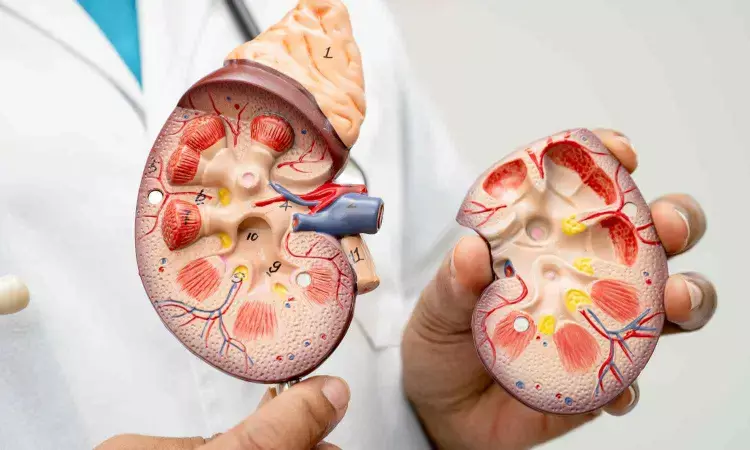- Home
- Medical news & Guidelines
- Anesthesiology
- Cardiology and CTVS
- Critical Care
- Dentistry
- Dermatology
- Diabetes and Endocrinology
- ENT
- Gastroenterology
- Medicine
- Nephrology
- Neurology
- Obstretics-Gynaecology
- Oncology
- Ophthalmology
- Orthopaedics
- Pediatrics-Neonatology
- Psychiatry
- Pulmonology
- Radiology
- Surgery
- Urology
- Laboratory Medicine
- Diet
- Nursing
- Paramedical
- Physiotherapy
- Health news
- Fact Check
- Bone Health Fact Check
- Brain Health Fact Check
- Cancer Related Fact Check
- Child Care Fact Check
- Dental and oral health fact check
- Diabetes and metabolic health fact check
- Diet and Nutrition Fact Check
- Eye and ENT Care Fact Check
- Fitness fact check
- Gut health fact check
- Heart health fact check
- Kidney health fact check
- Medical education fact check
- Men's health fact check
- Respiratory fact check
- Skin and hair care fact check
- Vaccine and Immunization fact check
- Women's health fact check
- AYUSH
- State News
- Andaman and Nicobar Islands
- Andhra Pradesh
- Arunachal Pradesh
- Assam
- Bihar
- Chandigarh
- Chattisgarh
- Dadra and Nagar Haveli
- Daman and Diu
- Delhi
- Goa
- Gujarat
- Haryana
- Himachal Pradesh
- Jammu & Kashmir
- Jharkhand
- Karnataka
- Kerala
- Ladakh
- Lakshadweep
- Madhya Pradesh
- Maharashtra
- Manipur
- Meghalaya
- Mizoram
- Nagaland
- Odisha
- Puducherry
- Punjab
- Rajasthan
- Sikkim
- Tamil Nadu
- Telangana
- Tripura
- Uttar Pradesh
- Uttrakhand
- West Bengal
- Medical Education
- Industry
Thiazolidinedione may reduce CV events and adverse renal events in diabetic patients: Study

A new study published in the Journal of Clinical Endocrinology and Metabolism showed that among type 2 diabetes mellitus (T2DM) patients with AKD, thiazolidinedione (TZD) showed a significant decrease in mortality, cardiovascular events, and adverse renal events. Over 422 million people suffer from diabetes (WHO 2023) throughout the globe, and by 2045, this prevalence may rise to 700 million. About 90% of people with diabetes are diagnosed with T2DM, which is caused by insulin insufficiency brought on by tissue insulin resistance and pancreatic β-cell malfunction.
Reduced estimated glomerular filtration rate (eGFR) < 60 mL/min/1.73 m² and/or structural kidney or urine abnormalities are characteristics of chronic kidney disease (CKD). By stimulating the peroxisome proliferator-activated receptor gamma (PPARγ) which is a nuclear transcription factor that controls many metabolic pathways, thiazolidinediones (glitazones), improve insulin sensitivity.
The function of thiazolidinedione in these individuals during the acute kidney disease (AKD) phase has not been well studied. In order to determine if utilizing TZD during AKD may lower the chance of significant negative effects in the future, Li-Yang Chang and colleagues carried out this investigation.
Prior to September 30, 2022, this research used the TriNetX platform to administer TZD to patients with type 2 diabetes mellitus (T2DM) within 90 days of receiving an AKD diagnosis. The risk of major adverse cardiovascular events (MACE), major adverse renal events (MAKE), and all-cause mortality are examples of clinical endpoints. Using 1:1 ratio propensity score matching (PSM), hazard ratios (HRs) and 95% CIs were computed.
TZD users were substantially less likely than those in the control group to experience an acute myocardial infarction, an intracerebral infarction, a major adverse cardiovascular event, or a major adverse renal event. However, there was no discernible decrease the combined risk of heart failure and death in TZD users.
According to subgroup studies, the advantages of using TZD were unaffected by hypertension, and while combining TZD with insulin, angiotensin-converting enzyme inhibitors, or angiotensin receptor blockers enhanced results, doing so with metformin had neutral effects.
Despite similar results for severe adverse cardiovascular and renal events, long-term TZD users had a higher mortality risk decrease than new users. The benefits of TZD usage continued long after stopping, according to landmark research. Overall, these results point to a possible advantage of using TZD to treat cardiovascular events in T2DM patients who also have AKD.
Reference:
Chang, L.-Y., Liao, H.-W., Chen, J.-Y., & Wu, V.-C. (2024). Enhanced Outcomes in Type 2 Diabetes Patients With Acute Kidney Disease Through Thiazolidinedione. In The Journal of Clinical Endocrinology & Metabolism. The Endocrine Society. https://doi.org/10.1210/clinem/dgae796
Neuroscience Masters graduate
Jacinthlyn Sylvia, a Neuroscience Master's graduate from Chennai has worked extensively in deciphering the neurobiology of cognition and motor control in aging. She also has spread-out exposure to Neurosurgery from her Bachelor’s. She is currently involved in active Neuro-Oncology research. She is an upcoming neuroscientist with a fiery passion for writing. Her news cover at Medical Dialogues feature recent discoveries and updates from the healthcare and biomedical research fields. She can be reached at editorial@medicaldialogues.in
Dr Kamal Kant Kohli-MBBS, DTCD- a chest specialist with more than 30 years of practice and a flair for writing clinical articles, Dr Kamal Kant Kohli joined Medical Dialogues as a Chief Editor of Medical News. Besides writing articles, as an editor, he proofreads and verifies all the medical content published on Medical Dialogues including those coming from journals, studies,medical conferences,guidelines etc. Email: drkohli@medicaldialogues.in. Contact no. 011-43720751


